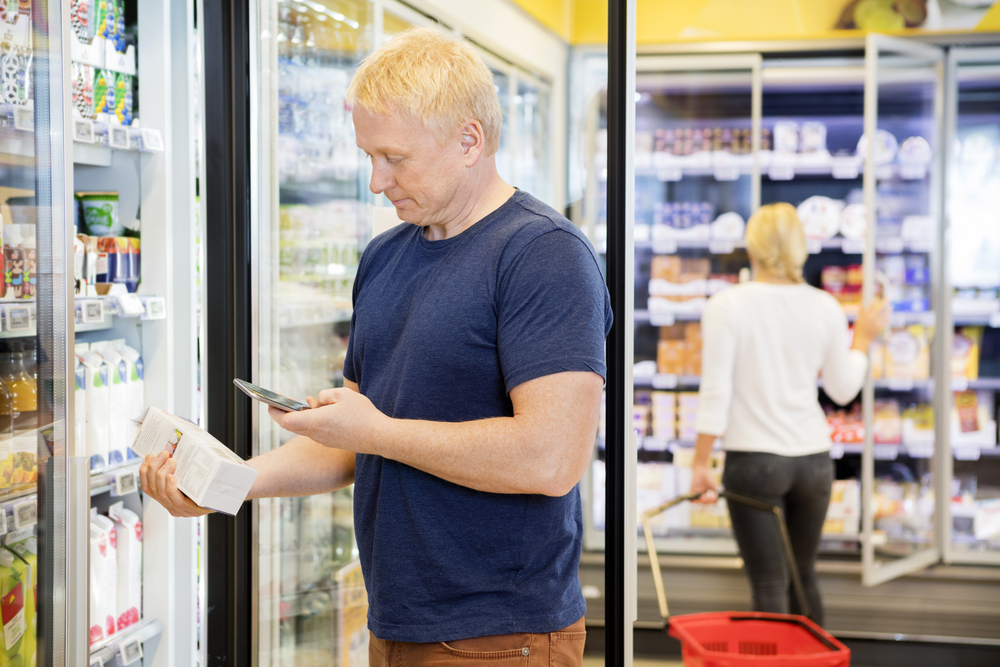Photo: Man in a supermarket scanning a bar code on a product with his mobile phone
They’re easy to download and increasingly easier to use but ingredients verification apps that don’t tell the whole story of a product may be false security to an unknowing halal-seeking public.
On May 26 a company in Malaysia released an app called ‘Verify Halal’ that informs users if products are halal-certified by the Department of Islamic Development Malaysia (JAKIM) or by a JAKIM-recognized foreign halal certification body, as per current information held in the Global Halal Data Pool (GHDP).
Unlike apps already in the market such as fellow Malaysia-made Halal Buddy and U.S.-developed Scan Halal, JAKIM-supported Verify Halal informs users if products are halal-certified as opposed to whether ingredients are halal or not. According to local media reports, Verify Halal currently holds information of products from more than 6,000 Malaysian companies and 60 affiliated global certification bodies, and covers four countries—Brunei, India, Malaysia, and Taiwan.
BENEFITS OF HALAL APPS
Apps such as Halal Buddy and Scan Halal are useful in countries short on halal-certified products and eating establishments but consumers should be aware of their benefits and limitations.
For a fact, it is not the same as checking for hazardous ingredients in sunscreen or skin care products. Certification protocols offer a much greater degree of scrutiny, and this should be understood by all who seek halal products.
The key issue for ingredients-checking apps is that even if grocery items do not cite obvious haram ingredients, there is a long list of complex food technology-derived ingredients that may confuse consumers. This is another area where apps may flag an unwary consumer, and most food safety authorities, such as the U.S. Food and Drug Administration (FDA), do not require manufacturers to list processing aids and packaging materials.
For example, L-cysteine seems innocuous as an ingredient often used in baked goods to soften the texture of the product. However, it may be originated from human hair, and is decidedly haram to consume.
Halal Buddy tells you that L-cysteine is “derived from proteins, including animal protein and hair.” The ingredient, adds Halal Buddy, is halal if “from fermentation and synthetic source” but haram if derived from “pig bristles and feathers which are clearly haram.”

Screenshot from the Halal Buddy app for search keyword "L-cysteine" on May 29, 2017
The issue facing the halal consumer in this case is that Halal Buddy’s explanation for L-cysteine is ambiguous and does not state definitively that L-cysteine can also originate from human hair. The explanation will also not inform consumers if that use of L-cysteine in that particular product is actually halal or haram.
Another example is cheese that is cultured with enzymes, of which many are unacceptable to halal consumers. Yvonne Maffei of MyHalalKitchen.com informs her audiences that sometimes cheese processing uses wine, beer, or lard washes on their outer rinds.
This kind of insider information is not displayed on a product’s label, and this is where the specialized knowledge of reputable certifiers and trained auditors who use standards and protocols to verify halal integrity is important.
HALAL CERTIFICATION
Most people do not realize the halal certification process does more than check ingredients and their sources but covers the product and all ingredients used both directly and indirectly (cleaning agents, for example), from farm to manufacturing to packaging to transportation to storage.
A certification application is a complex and detailed analysis that vets compliance with health and food safety, religious ritual integrity, industrial hazard check points, and packaging and transportation standards compliance with risk avoidant practices to protect the products from contamination of biological and chemical properties that violate the halal status, and finally government documentation verification.
Smaller scale enterprises are significantly less complicated and time consuming to review versus multi-location processing operations. Likewise, manufacturing single ingredient commodities is easier to review compared to multi-ingredient products, especially with variations in flavors.
Should any sourcing or ingredient in processing change, the certification body requires a new review.
Increasingly, certifiers are also utilizing laboratory analysis as a double check to give full confidence to the consumer that the products are pure from contamination.
Once the ingredients and their sources are cleared, on-site auditing looks for evidence that all records, operations at plants, employee training, chemicals used, storage and packaging, and religious oversight of processes are verified.
Certificates of halal typically last at least a year’s duration, so renewal schedules should anticipate their timing based on the previous year’s review.
CONSUMERS’ ROLE AND THE FUTURE OF HALAL
The responsibility of consumers is vital to the deliverance of halal products because only with their consent can inferior products be considered acceptable, and with their due vigilance can fraud and negligent manufacturers be thwarted.
Unfortunately, there is fraud in the industry, and there have been many publicized cases of the use of fake halal logos and expired certification licenses that consumers can flag and notify authorities if they wish to be stewards of the halal movement.
Muslims should find opportunity for jobs in the areas of food science, safety, chemical engineering, and in halal auditing, as Muslim food and beverage spending expands to an estimated $1.9 trillion by 2021. There is ample opportunity via a range of halal sectors and sub-sectors.
Working toward improving the development of this industry is a joint effort, and while halal apps have a place in helping to some degree, they will never be able to fully take the place of qualified certification and accreditation organizations that safeguard the interests of the public.
© SalaamGateway.com 2017 All Rights Reserved


Susan Labadi